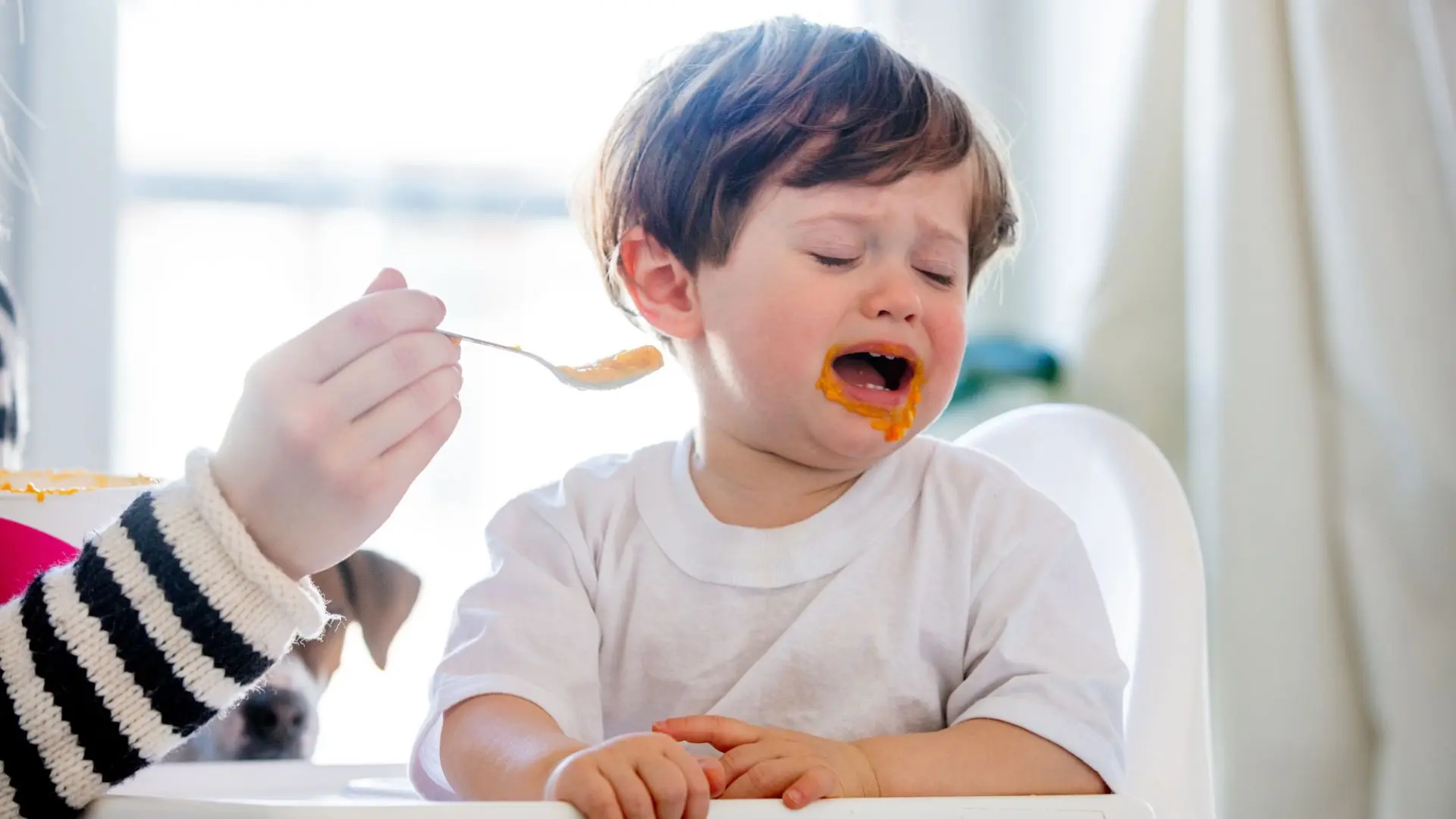
When your toddler refuses to eat, it can feel like an endless battle—leaving you worried, frustrated, and sometimes even defeated. From turning up their nose at breakfast to pushing away dinner or avoiding nutritious foods like vegetables, it’s natural to wonder if you’re doing something wrong.
But you’re not alone, and there’s often a reason behind the food refusals that go beyond simple pickiness. Understanding the real causes behind your child’s eating habits can make all the difference, giving you the tools to turn these challenging moments into positive, stress-free mealtimes.
Let’s dive in to uncover what might be going on and how to make a change.
In This Blog
ToggleWhat Happens When Toddlers Refuse to Eat?
A toddler refusing to eat can manifest in several ways—refusing dinner, skipping breakfast, or turning down certain foods like meat or vegetables.
you might feel like you’re doing something wrong, but often, it’s just a stage in their development. This behavior can be frustrating, but it’s also temporary and can be managed with the right approach.
1. Teething and Sore Gums
Teething is one of the biggest reasons your toddler may refuse to eat. The discomfort from sore gums can make it difficult for them to chew solid foods, especially hard or crunchy items. Soft, cool foods can provide relief and encourage eating.
2. Growth Spurts
Just like adults, toddlers go through growth spurts that can affect their appetite. During these periods, they may eat more than usual or, on the flip side, may refuse to eat altogether. This change in eating habits can be temporary, and your toddler’s appetite should normalize once the growth spurt is over.
3. Illnesses and Infections
Minor colds, stomach bugs, or even an ear infection can make your toddler less interested in food. If your child is refusing to eat and showing signs of illness, consider taking them to the pediatrician to rule out any underlying health issues.
4. Food Sensitivities and Allergies
Food allergies or sensitivities can also cause your toddler to reject certain foods. For example, a toddler who refuses meat might have an intolerance to certain proteins or flavors. If food sensitivities seem to be the cause, consult with your doctor or a nutritionist to pinpoint the issue.
5. Emotional Stress
Toddlers are incredibly sensitive to changes in their environment. Separation anxiety, changes in routine, or family stress can lead to emotional eating struggles. Mealtime can become a battleground when your toddler is feeling stressed or overwhelmed.
What to Do When Your Toddler Refuses to Eat
The struggle with a toddler who refuses to eat often plays out during specific meals. Here’s how to address some common scenarios:

Why Toddler Refuses to Eat Dinner
After a long day of activities, your toddler might be tired, overstimulated, or simply uninterested in food. The evening meal can also coincide with an urge for independence, where your child may want to control what they eat, making them resistant to your choices.
Effective Solutions
- Create a calm, distraction-free dining environment: Turn off the TV and put away toys to focus on the meal.
- Offer smaller, more frequent meals: Toddlers can be less interested in large, heavy meals but may enjoy smaller portions throughout the day.
- Focus on variety and presentation: A plate full of different colors and textures can engage your toddler’s curiosity. Try arranging food in fun shapes or creating “food art” to spark their interest.
Why Toddler Refuses to Eat Breakfast
Toddlers may skip breakfast because they’re still tired, not hungry, or distracted by something else. This is a common issue, especially if they’ve had a late or heavy dinner.
Practical Solutions
- Keep breakfast options simple yet nutritious: Choose quick, easy-to-eat meals like oatmeal, scrambled eggs, or a smoothie.
- Introduce fun, interactive foods: Offer mini pancakes, DIY breakfast bars, or fruit with yogurt for dipping.
- Stick to a consistent routine: Toddlers thrive on routine. Offering breakfast at the same time every day can help them build a natural hunger rhythm.
Why Toddler Refuses to Eat Meat
Some toddlers simply don’t like the texture or taste of meat, while others might be influenced by environmental factors, such as exposure to vegetarianism. In some cases, toddlers refuse meat due to sensory sensitivities or dislike of certain textures.
How to Address the Meat Struggle
- Try different meat textures: Some toddlers prefer shredded meat over chunks.
- Experiment with plant-based protein alternatives: Offer beans, tofu, or eggs as protein sources.
- Introduce meat in disguised forms: Mixing meat into sauces or blending it into veggie-filled dishes can make it more appealing.
Why Toddler Refuses to Eat Fruits and Vegetables
Vegetables can be bitter or have a texture that toddlers are not yet comfortable with. They also tend to have a preference for sweeter foods, which may make fruits easier to accept than vegetables.
Practical Ways to Encourage Fruit and Veggie Consumption
- Make fruits and vegetables visually appealing: Cut fruits and veggies into fun shapes or serve them in colorful arrangements.
- Introduce hidden veggies: Blend vegetables into smoothies, sauces, or baked goods to sneak in the nutrients.
- Involve your toddler in food prep: Kids are more likely to try new foods when they’ve had a hand in preparing them.
- Use positive reinforcement: Celebrate small victories by praising your toddler for trying new foods.
Conclusion
When your toddler refuses to eat, it can be frustrating, but with patience and the right approach, you can make mealtime a more positive experience.
Remember, toddler refusal to eat is often just a phase, and by offering variety, reducing pressure, and involving your child in food choices, you can help them develop a healthier relationship with food.
Be consistent, stay calm, and keep introducing new foods. In time, your toddler’s food preferences will evolve, and you’ll see mealtime struggles become a thing of the past.
Stay patient, stay positive, and trust that your toddler will eventually find their way to healthy eating!
You may also be interested in : Step-by-Step Guide to Potty Training a Toddler: Tips for Boys and Girls




